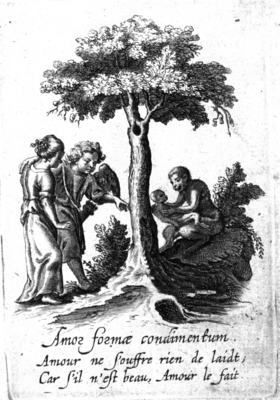Censura Amoris [11]

XI.
Aristot.
Cat.
Vnicuique delectabile est quod amat. nam,
Dulcis Amor, furor est. stupet ebria simia prolem,
Nilque suis catulis pulchrius esse putat.
Nescit amans vitium (nimis id licet exstet) amicæ,
Quasque alius dotes non videt, ipse notat.
Fucus Amor vehemens, omnique potentior herba est,
Hoc duce, facundæ garrula nomen habet.
Quisquis amat, mentes agitante Cupidinis æstro,
Omne bono vitium proximiore tegit.
Aristot.
Cat.
Vnicuique delectabile est quod amat. nam,
Dulcis Amor, furor est. stupet ebria simia prolem,
Nilque suis catulis pulchrius esse putat.
Nescit amans vitium (nimis id licet exstet) amicæ,
Quasque alius dotes non videt, ipse notat.
Fucus Amor vehemens, omnique potentior herba est,
Hoc duce, facundæ garrula nomen habet.
Quisquis amat, mentes agitante Cupidinis æstro,
Omne bono vitium proximiore tegit.

Horat.
Turpia decipiunt cæcum vitia, aut enim ipsa
Delectant, veluti Balbinum Polypus Agnæ1.
Turpia decipiunt cæcum vitia, aut enim ipsa
Delectant, veluti Balbinum Polypus Agnæ1.

Censure de l'Amour.
XI.
Amour pipeur, que ne scais tu pas faire?
Amour sorcier, que ne ferois tu plaire?
A l'oeil charmé d'vn esprit amoureux?
L'enfant plus laid semble bel à son pere,
Et le guesnon plaist aux yeux de sa mere.
En fin, Amour, tu fais ce que tu veux.
XI.
Amour pipeur, que ne scais tu pas faire?
Amour sorcier, que ne ferois tu plaire?
A l'oeil charmé d'vn esprit amoureux?
L'enfant plus laid semble bel à son pere,
Et le guesnon plaist aux yeux de sa mere.
En fin, Amour, tu fais ce que tu veux.
Translations
 |
The judgement of love. |
 |
To anyone what he loves is delightful. For: |
 |
The lover names the sons of the gods white, while designating them as black in the case of those of men. For love like a creeper
has the power of attaching itself under any pretext whatsoever. |
 |
An ass is beautiful to an ass, and a swine to a swine. |
 |
Love is the spice of beauty. |
Literature
Sources and parallels
-
Same copperplate, slightly altered, in: Al wat men bemint schynt schoon [14] (in: Willem den Elger, Zinne-beelden der liefde (1703))
[Compare
![Compare [compare]](/static/images/compare2.gif) ]
]
-
Ape and her young, in:Amor, formae condimentum. [3] (in: Jacob Cats, Proteus (1618))
[Compare
![Compare [compare]](/static/images/compare2.gif) ]
]
-
Parallel for the pictura (ape and her young) and quote in the pictura/subscriptio as motto in:Amor, formae condimentum. [4] (in: Jacob Cats, Sinne- en minnebeelden (1627))
[Compare
![Compare [compare]](/static/images/compare2.gif) ]
]
-
Same message in the subscriptio (love blinds) in: Amori quæ pulchra non sunt, ea pulchra videntur [104] (in: Otto Vaenius, Amorum emblemata (1608))
[Compare
![Compare [compare]](/static/images/compare2.gif) ]
]
-
Same message in the subscriptio (love blinds) in: Un Amour qui meine une Borge par la main (in: Daniel de la Feuille, Devises et emblemes (1691))
[Compare
![Compare [compare]](/static/images/compare2.gif) ]
]
References, across this site, to this page:
- Amor, formae condimentum. [3] (in: Jacob Cats, Proteus (1618))
- Amor, formae condimentum. [4] (in: Jacob Cats, Sinne- en minnebeelden (1627))
- Al wat men bemint schynt schoon [14] (in: Willem den Elger, Zinne-beelden der liefde (1703))
- Un Amour qui meine une Borge par la main (in: Daniel de la Feuille, Devises et emblemes (1691))
- Amori quæ pulchra non sunt, ea pulchra videntur [104] (in: Otto Vaenius, Amorum emblemata (1608))
Iconclass
Cupid and a girl are looking at a monkey that is admiring her own young- monkeys, apes (+ animal 'educating the young', playing with young)
[25F22(+422)]

- index finger forwards, pointing, indicating
[31A25552]

- adolescent, young woman, maiden
[31D13]

- laying the hand on another person's shoulder
[33A15]

- mother-love (+ variant)
[42B12(+0)]

- Beauty; 'Bellezza' (Ripa) (+ emblematical representation of concept)
[51D4(+4)]

- (personifications and symbolic representations of) Love; 'Amore (secondo Seneca)' (Ripa) (+ clothed with wings)
[56F2(+1331)]

- (personifications and symbolic representations of) Love; 'Amore (secondo Seneca)' (Ripa) (+ emblematical representation of
concept)
[56F2(+4)]

- proverbs, sayings, etc. (with TEXT)
[86(CENSURA AMORIS)]

- (story of) Cupid, Amor (Eros)
[92D1]

- attributes of Cupid (with NAME)
[92D18(QUIVER)]

Comments
commentaryNotes
Horat. Serm. I, 1, 3, ll. 39-40.
'Asinus asino, et sus sui pulcher est': very widely known, much quoted, but it is not from Persius: it goes back ultimately
to the Greek comic poet Epicharmus, quoted in Diog. Laert. III, 16. A Latin translation of this work may be the source here.
The erroneous ascription to Persius may be due to the mention both of a donkey and of Eupolis, another Greek comic poet, in
Pers. 1, 120 sqq.
![[H O M E : Emblem Project Utrecht]](/static/images/rd-small.gif)




































































































